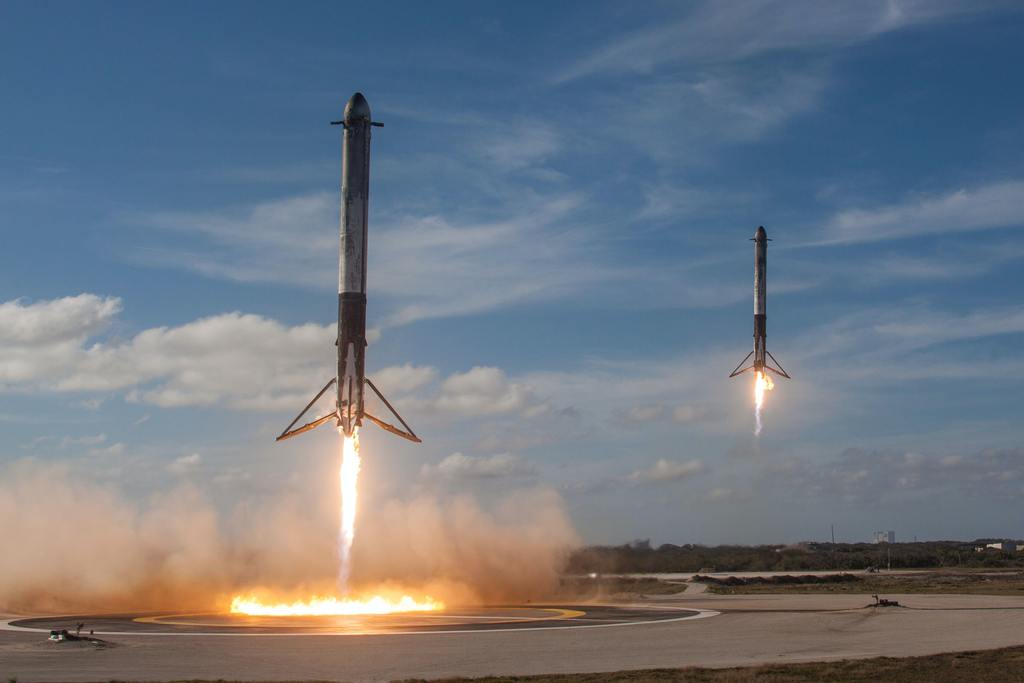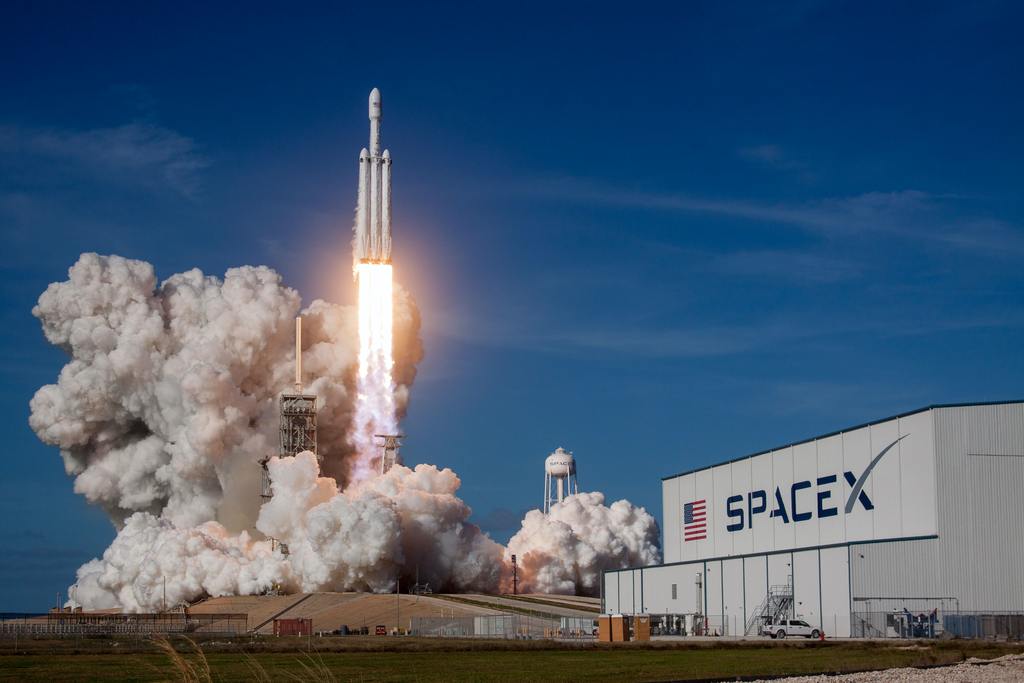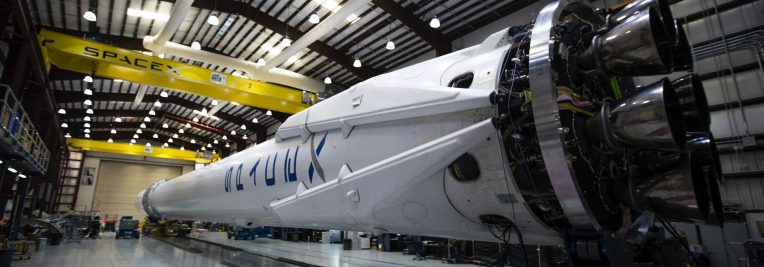We need to talk about SpaceX. What was once depicted as an egalitarian foray into space technology is now coming of age and the results are worrying. It is becoming clear that SpaceX and other similar private-sector companies are less about the new frontiers of human exploration through shared endeavour and more about profiting from global conflict, wrought large onto an interstellar scale.
SpaceX is a key player in the global military-industrial complex and complicit in the devastation that might result from its facilitation of future warfare.
In just the past few months we’ve had announcements that alone would be cause for concern, but together paint a darker picture of what is going on behind the scenes. It started with word that the Pentagon had chosen SpaceX as one of its ‘two primary launch services for U.S. national security missions’. Following this were statements that the US Military had conducted research into how Starlink could be used as an unjammable and highly accurate alternative to GPS; in addition to earlier news of the US Air Force testing the system for encrypted internet capability for their squadrons around the world.
Even more recently, these have all been combined with another announcement from the Pentagon that they were working together on the quick delivery of cargo loads (i.e. military supplies) anywhere on Earth within an hour. SpaceX’s intensely busy schedule of working with the US government on their military capabilities continues unabated with the successful launch of a new GPS satellite for the US Space Force just a few days ago.

All of that might seem like a lot of collaboration (because it really is) in just the past few years, but it doesn’t stop there. SpaceX has received a large-scale contract in 2020 to develop missile defense system satellites for a department of the Pentagon that will be subsumed into the US Space Force in 2022. This gets even murkier when we note that Microsoft is listed as a subcontractor for this project, working for SpaceX while simultaneously partnering with them on a broader level through their newly formed (and militaristically named) Aerospace and Satellite Solutions unit.
The first public indications of SpaceX allying itself with the US military-industrial complex came in its early days. A press release announcing that they had secured a $100 million launch services contract in 2005 began an ongoing relationship with the US Air Force and Department of Defense that has continued ever since. In 2016, when pushed by a journalist on the fact that SpaceX only hired American workers, Elon Musk answered that this was due to US laws surrounding the International Traffic in Arms Regulation (ITAR).
Things have since progressed quickly and not just in regards to the dual-use possibilities of rocket technology. To highlight another example, in 2018 SpaceX delivered into orbit a ‘restricted payload’ for the defense contractor Northropp Grumman. In case that name isn’t familiar to you, they are one of the world’s largest weapons manufacturers; perhaps most infamously known for their development of high-energy laser weapons. And what happens when the US Air Force decides to go with a competitor? SpaceX are so invested in being the go-to solution that they sue to try and overturn contract decisions that don’t go their way.
I encourage you to read through all the links above, because it’s an astonishing amount of activity. All of it before even factoring in the close working relationship SpaceX has with NASA that involves research and development on rocket and space travel technology in order to deliver long-term contractual (i.e. profitable) relationships, most of which can have a dual-purpose for military use. The central role that SpaceX is playing in the US military-industrial complex is abundantly clear.
This shouldn’t have surprised us, of course, even though it was kept off the mainstream news until these projects have nearly fully matured (lest any negative public sentiment start growing). But there’s yet another element starting to emerge. When looking at all the activity that is taking place in the area of military and surveillance capabilities (i.e. imaging and communications satellites) in orbit and beyond, SpaceX isn’t just setting itself up as part of the military-industrial complex for the United States, but is now positioned on a global level for any nation state with the funds (and permission) to participate. SpaceX is part of the global mercenary class that will sell its wares to the highest bidder as long as they aren’t a threat to US global dominance or the powerful interest groups behind its geopolitical strategy, for which SpaceX are currently serving with the utmost loyalty.
Early evidence of this mercenary focus can be seen with the recent announcement that they will be delivering a communications satellite for the Erdogan regime in Turkey. This has received consistent protest from Armenian activist groups, who state that the satellite will be used for military purposes in their ongoing persecution. Previous to this, in 2018, SpaceX also delivered two satellites for the authoritarian regime of Kazakhstan; including one that could be used for highly accurate surveillance imaging. Interestingly, this launch with the Defense Department of Kazakhstan represented a move away from the country’s previous work with Russian rocket deliveries. A launch and client that shows how SpaceX is playing a central role in the shifting power dynamics of government space programmes around the world.

When we look at the funding that SpaceX has received throughout its rapid growth to the top of the private space industry, combined with the customers that are now lining up with opaque payloads, it is becoming increasingly clear that SpaceX is primarily involved in the militarisation of space. This isn’t a side project, but rather it is arguably their central purpose and is certainly at the moment their primary role in practical terms.
When you consider the amount of money involved in government defense contracts (in 2016, for example, the US government contracted over $231 billion to the private sector), it also seems likely that this will be their primary revenue stream for the foreseeable future. In a 2019 spending bill, the US Congress approved $8.1 billion dollars for the Pentagon to use specifically for investments in space systems and SpaceX has positioned themselves to be part of the inner circle of private-sector companies that have been vetted by the US government to serve their imperialist goals.
Which makes the irreverent persona and antics of Elon Musk all the more off-putting, because when he tweets out aggressive late-capitalism statements such as “we can coup wherever we want!” he does so knowing that he is playing an active role in doing just that. It’s not a joke, even though it might be spun as one. SpaceX is positioning itself (has positioned itself) as one of the key transportation arms of the Pentagon and its goals of global influence and dominance over perceived enemies. The reality of this gets lost in among all the fluff pieces about cars floating out in space, or unattainable dreams of casually visiting Mars within our lifetime. Those are the public relations propaganda that hides the real purpose of SpaceX and its current activity as a facilitator of American Imperialism.
What does this mean for the future of the private space industry? Unsurprisingly, it means that these companies aren’t operating for the betterment of humanity (even though they are often portrayed as such) but are positioning themselves to be at the forefront of the cosmic gold rush. Both in terms of the accumulation of wealth through mining resources off-planet, but also in the conflicts that are going to take place between nations as they jostle one another for both offensive and defensive purposes throughout Earth’s orbit and beyond.
The boom in private sector facilitation of government space programmes isn’t just limited to SpaceX, of course, nor is it solely the domain of the aggressive aspirations of the US government. China has been pushing ahead as quickly as possible with its own private sector space-industry alliances, with over 100 companies now on board and helping them develop technology in this area. Some of these companies are now operating at the same scale as SpaceX in terms of investment and size of workforce, such as Galactic Energy that is rapidly advancing with an opaque programme of research and payload delivery. There are also numerous companies in Russia, India, Japan among others; and the European Union is ramping up their funding efforts into long-term commercial space programmes. All of these are dwarfed by the efforts of the United States and China.
We know that space exploration, utilisation and colonisation will come to define the next phase of human civilisation in ways that we can’t yet fully comprehend; but just how heavily weighted such endeavours will be to military operations is alarming in its ramifications for what the future holds. The new space race isn’t about colonising Mars or building the first international base on the Moon, it’s about dominating the upper atmosphere and orbit of Earth itself.

Unfortunately for those of us watching this buildup occur, there’s not very much that can be done. The machinations of power are turning and they have demanded a private-company solution to enabling infrastructure for an interstellar supply chain. This tight-knit relationship can then be harnessed to support the allies of the Pentagon without much oversight or accountability; nor an ability for the public to call foul on the misuse of their tax dollars (as if that’s ever stopped them!). All of this while shareholders and celebrity CEOs accumulate huge amounts of wealth in the process; and that’s before they start mining asteroids for trillions of dollars worth of rare minerals!
It is still important, though, for the mainstream perception of what SpaceX is to shift towards a clearer understanding in its role of supporting the deployment of military technology. The notion that SpaceX is a central part of the global military-industrial complex – and is therefore complicit in the devastation that war brings to innocent people around the world – runs contrary to the space-tourist, Mars-exploring, astronauts-in-cars public image that is being presented to the world through the mainstream media and SpaceX’s own intensive public relations campaigns. This manufactured perception needs to change so that the reality of what they are facilitating can be more openly discussed and debated.
The web of American Imperialism is a purposefully convoluted one, which only becomes even more complex and difficult for the average person to keep an eye on when you start to consider how these private sector companies operate on a global scale. One thing is for certain, SpaceX will have blood on its hands (if it doesn’t already) as a result of their facilitation of warfare and profiting from military operations from many different regimes around the world. Just like how we consider where Apple sources their materials from, and the conditions for factory workers and use of child labour in places such as China and India, we should also be having a public conversation about the role that SpaceX is playing in the global warfare industry and the ethics of doing so.
If we have any hope in shifting the course of future events to a more positive and egalitarian outcome, then how we treat space exploration and the next stage of human evolution out into the stars is of vital importance. By understanding how companies such as SpaceX (and technocratic oligarchs such as Elon Musk) are currently operating and what they are actually doing, we can put pressure on those companies who do not meet our collective standards or have our best interest at heart.
Only then can we truly say that we are reaching for a bright future together among the stars.
All images used in this article are in the public domain.





